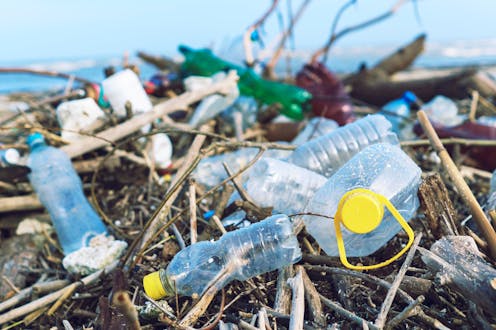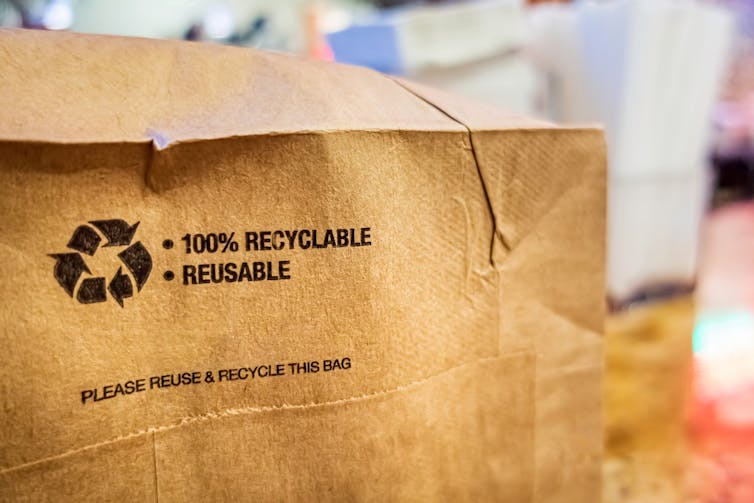
The world produces a vast amount of plastic. Global plastic production increased from 2 million metric tons in 1950 to 348 million metric tons in 2017. Yet much of this plastic is wasted: 86% of the world’s plastic waste in 2016 was either incinerated, sent to landfill or leaked into nature.
Many countries use international trade to manage their plastic waste. The justification for this is that plastic waste can be treated in destinations with better capacity for waste treatment. The UK, lacking capacity itself, exports 60% of its plastic waste abroad. But in a recent report, the House of Commons Environment, Food and Rural Affairs Committee – the group of MPs responsible for improving and protecting the environment – have called on the government to stop the export of UK plastic waste by the end of 2027.
The movement of hazardous waste is controlled by an international agreement called the Basel Convention. It requires the consent of the receiving country, accurate labelling of waste, and notification when plastic waste has been treated for waste to be exported legally. The Convention has recently increased the range of plastics that fall within its remit.
China has long been the world’s leading plastic waste importer. But in 2017 its government banned plastic waste imports, citing concerns over the low quality of material received. This has displaced vast quantities of plastic waste. The UK now exports most of its plastic waste to Turkey, Indonesia, Vietnam, Malaysia and the Netherlands.
Passing the burden
The import of plastic waste is a valuable source of foreign exchange for many countries. But these countries often have limited waste treatment infrastructure.
Uncontrolled imports can therefore lead to the volume of plastic waste received exceeding the capacity of a country to cope with it. It also displaces its ability to treat its own domestic waste. The result is more plastic waste than can be safely handled and high levels of mismanagement.
Once a country has received the waste, monitoring of the treatment process is also scarce. A Greenpeace investigation in 2021 found evidence of plastic waste from the UK and Germany dumped illegally across 10 sites in southwestern Turkey.
But mismanaged plastic waste is one of the main causes of plastic pollution in nature. One report estimates that 56% (239 million metric tonnes) of global annual plastic waste production by 2040 will be subject to mismanagement.
Exporting plastic waste also raises ethical questions. It allows exporting nations to forgo their responsibility to deal with their own plastic waste while claiming to be managing their waste responsibly.
Upstream solutions
A more systemic and responsible way of dealing with plastic waste is to reduce plastic consumption. The Committee’s report recommends measures that focus on reducing plastic waste at source, rather than improving the ability of waste treatment infrastructure to manage a greater capacity of waste.

The key suggestion was to accelerate the introduction of Extended Producer Responsibility schemes. Extended Producer Responsibility is an approach that aims to make companies bear a greater proportion of the cost of disposing the plastic they use for products put on the market. These schemes will apply to all companies in the UK who put at least 1 tonne of plastic packaging on the market each year by 2030, encouraging them to reduce their production of plastic waste. This can be achieved through innovations to “design out” plastics or by transitioning to a circular economy where plastic materials are reused or fully recycled.
The Committee’s report recommends the establishment of a plastic reuse task force, composed of representatives from industry and consumer groups. The group would coordinate strategies including incentives to adopt business models that encourage the reuse of plastic materials, single-use plastic charges, mandatory reporting on a company’s plastic footprint, and public campaigns to raise the profile of reuse schemes.
Deposit-return schemes also help and are already in progress in the UK. In 2023, Scotland will launch a national programme where people will pay a 20p deposit when they buy a drink in a plastic bottle or can, which will be repaid when the empty container is returned.
Plastic waste is a global problem
The recommendations made by the Committee are a positive step forward and would place the UK in a position of international leadership on tackling plastic pollution. But plastic value chains are transnational and waste is generated at each stage. This reduces the effectiveness of isolated national action.
National policies often do not have the reach or influence to tackle the global causes of plastic pollution. Research that I co-authored found that isolated policies including national bans on plastic products are ineffective in reducing the generation of plastic waste. Fragmented national policies can also create loopholes in international policy that inadvertently reroutes plastic waste towards the destinations least equipped to deal with it.
But earlier this year, 173 countries formally adopted a UN resolution to start negotiations for a global legally binding agreement to end plastic pollution by the end of 2024. The World Trade Organisation has also launched an initiative to explore how trade policies can be used to reduce plastic pollution. International cooperation over plastic waste policy, along with the legal power of the Basel Convention, offers hope of a coordinated global response to plastic pollution that avoids policy fragmentation.
Environmental groups are critical of the trade in plastic waste. The Committee’s recommendation to ban UK plastic waste exports by 2027 is therefore an ambitious and welcome step forwards in tackling plastic pollution. But without global action, isolated national policies will not deliver change on the scale required to end this controversial trade.
Steve Fletcher has received funding from the UN Environment Programme. He is a member of the UN International Resource Panel.
This article was originally published on The Conversation. Read the original article.







